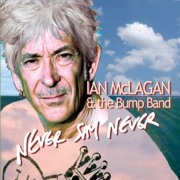the Bump Band:
Never Say Never
- Rock
- 2009
- Buy the CD
Reviewed by Jeff Giles
()
Understandably, McLagan’s own music hasn’t always been his highest priority – he took a 20-year break between his second and third solo albums – but since the turn of the century, he’s been on a bit of a tear; 2000’s Best of British kicked off an impressive run that, with the release of Never Say Never, includes five studio releases and a live collection – in addition to his tenure in Billy Bragg’s band and ever-crowded session schedule.
Sadly, Never Say Never has its roots in tragedy – the album is dedicated to McLagan’s late wife, Kim, whose death in a car accident prematurely ended their 28-year marriage in 2006. Fans of McLagan’s sweetly ragged brand of pub rock needn’t worry, though; the album boasts the same proudly imperfect blend of shout-along rockers and boozy ballads you’ve come to expect, starting with the title track, a down-tempo, electric piano-led number that sounds like it could be a new Faces recording.
The highlights pile up like peanut shells at the bar: The seesaw groove of "Little Black Number," the classic rock rave-up of "I Will Follow," the vaguely Hawaiian lilt of "Killing Me with Love," the Felice Brothers cover-in-waiting "My Irish Rose." The album’s only real bum note comes with "Where Angels Hide," a solo piano ballad that exceeds McLagan’s limited vocal grasp. The crooked, one-legged hop of his croon is usually part of McLagan’s charm, but it works better as part of a song’s seasoning than as a lead instrument – something underscored by some of the album’s superior slow songs, like the beautiful, Hammond-laced waltz that closes the album, "When the Crying Is Over," or "Loverman," which almost sounds like a lost Pussy Cats-era Nilsson track.
It won’t attract a lot of attention outside the classic rock faithful, but for anyone who misses the Faces – or the late ‘70s heyday of pub rockers like Nick Lowe – Never Say Never proves the old way of doing things still works wonderfully.
You can follow us on Twitter and Facebook for content updates. Also, sign up for our email list for weekly updates and check us out on Google+ as well.













